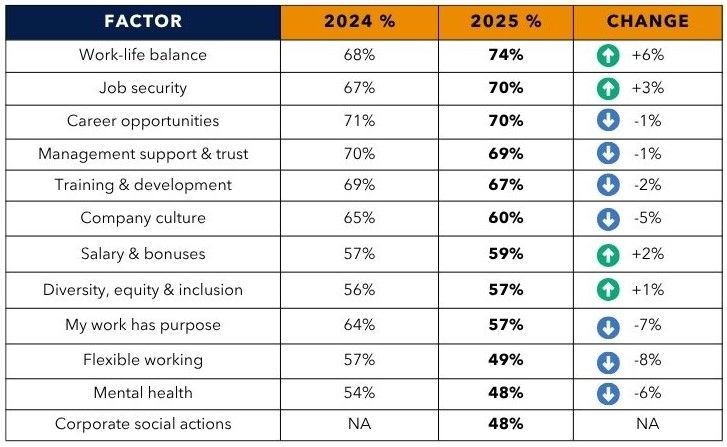What Employees Really Want in 2025
Each year, we ask: what really matters most to employees?
Our 2024 national Employment and Salary Trends report highlighted that career opportunities, management support and training and development were the top priority for employees.
Fast forward to the 2025 report, which reveals that employee priorities have continued to evolve—and in some cases, shift significantly— influenced by changing economic conditions, workplace dynamics, and societal expectations.
So, what do employees really want in 2025?
1. Work-Life Balance: The New Top Priority
Once a nice-to-have, work-life balance is now the top priority for employees in 2025, reflecting a post-pandemic emphasis on personal well-being. While it was important to 68% of employees in 2024, this figure has risen to 74% and definitively overtaken other traditional motivators such as salary. This reflects a wider societal shift where boundaries between personal and professional life have become more defined—especially in the wake of return-to-office policies.
|
Compared to 2024: Work-life balance has moved from a top-three concern to the undisputed #1 priority in 2025.
2. Job Security and Career Opportunities: Equal Importance
While career opportunities led in 2024, with 71% of employees prioritising them, job security has now become equally important, with both factors at 70% in 2025. This shift suggests that employees are balancing aspirations for long-term growth with a desire for stability, especially amid uncertain economic conditions when job security becomes a non-negotiable, and workers want to see a clear path forward in their roles.
| Trend Note: Career progression was a rising priority in 2024. The fact that it’s now level with job security shows employees want more than a job—they want a future.
3. Management Support and Trust: A Critical Factor
In 2024, management support and trust were crucial for 70% of employees. In 2025, this has slightly decreased to 69%, but it remains a significant factor. Trust in leadership is no longer optional. Employees want to feel heard, supported, and valued and continue to seek leaders who are supportive, transparent, and trustworthy, valuing open communication and ethical leadership.
| 2024 vs. 2025:
This factor has climbed in importance, indicating that the human element of leadership is just as important as strategic direction.
4. Training and Development: Still a Necessity
Training and development were important for 69% of employees in 2024. In 2025, this has remained fairly steady at 67%, indicating a continued emphasis on skill enhancement. As automation and AI continue to reshape job roles, employees are recognising the need to prioritise skills growth to stay relevant and ensure career mobility.
| Significant Shift: In previous years, training was often overlooked in favour of compensation. Now, it’s a top five requirement.
5. Company Culture: Still a Key Consideration
Company culture remained important for 65% of employees in 2024. In 2025, this has slightly decreased to 60%, suggesting that culture alone is no longer enough to win top talent—it must be paired with practical benefits and career pathways.
| Hot tip:
culture still plays a vital role in employee satisfaction so don’t underestimate it - a positive, inclusive, and supportive culture contributes to higher engagement and retention.
6. Salary and Bonuses: Gaining Ground Again
After a period where purpose and flexibility seemed to eclipse pay, salary and bonuses have crept back up the priority list in 2025—rising from 57% to 59%. While still not a top-three factor, this modest increase suggests that economic pressures like uncertain interest rates and cost of living are making compensation packages more front-of-mind for employees again.
| What this means for employers:
Competitive salaries are once again part of the decision-making equation—not the whole story, but an important piece.
7. Diversity, Equity & Inclusion: A Quiet but Steady Climb
In 2025, 57% of employees identified diversity, equity, and inclusion (DE&I) as a key priority—up slightly from 56% the year before. While not topping the list, this upward trend signals that DE&I is no longer viewed as a “nice-to-have,” but as an expected part of a healthy workplace culture.
| Key takeaway: Employees want to see DE&I embedded into everyday practices—not just highlighted during awareness months.
8. Purposeful Work: Still Valued, but Less of a Priority
In 2024, 64% of employees said it was important that their work felt meaningful. In 2025, that number has dipped to 57%, suggesting that while purpose still matters, it's no longer a leading motivator in career decisions. As economic and practical concerns like stability and balance rise in importance, ideals like purpose may be taking a temporary back seat.
| Insight for leaders: Purpose still plays a role in engagement—but in 2025, it needs to be grounded in real opportunities, not just messaging.
9. Flexible Working: Now an Expectation, Not a Perk
In 2024, 57% of employees considered flexible working a key priority. In 2025, that figure has dropped to 49%. This decline doesn’t suggest flexibility is no longer valued—it likely means it’s become a baseline expectation. Hybrid or remote options are now standard in many industries, so they're no longer viewed as standout benefits.
| The message to employers:
If you’re still treating flexibility as a “bonus,” you may be behind the curve. In 2025, it’s often expected to be part of the job description.
10. Mental Health Support: Still Important, But Less Front-of-Mind
In 2024, 54% of employees prioritised mental health support when evaluating employers. In 2025, that number has decreased to 48%. This drop may reflect that many workplaces have already integrated basic mental health initiatives, making it feel less urgent or differentiating.
| The takeaway:
While mental health support remains a valued part of the employee experience, it’s now expected to be part of the standard offering—no longer a standout benefit, but a baseline requirement.
11. Corporate Social Actions: A New Entry That Matters to Nearly Half
New to the list in 2025, corporate social actions—including sustainability efforts, community involvement, and ethical business practices—are a priority for 48% of employees. While it hasn’t cracked the top tier of concerns, its debut at nearly half suggests that employees are paying closer attention to how companies show up in the world beyond profit.
| Why it matters: In a competitive job market, demonstrating genuine social impact can strengthen employer brand and build trust—especially with younger, values-driven candidates.
Emerging Trends in 2025: What’s Next for Employers?
The 2025 data tells a clear story:
employees are recalibrating what they value—and it’s no longer just about flashy perks or trendy policies.
- Work-life balance,
job security, and
career growth dominate the top of the list, signalling a desire for both personal well-being and long-term professional stability.
- Purpose and
mental health, while still important, have slipped slightly—perhaps reflecting shifting focus in a tougher economic climate.
- Flexibility and
inclusion
are no longer seen as standout offerings, but as baseline expectations in today’s workplaces.
- And for the first time,
corporate social actions have entered the conversation—showing that nearly half of employees are now factoring in how businesses behave beyond the office.
The Bigger Picture:
The modern workforce is becoming more values-conscious, but also more pragmatic. Employees want to feel supported, secure, and seen—but above all, they want to work for employers who understand that people are whole humans, not just workers.
For employers, the message is clear: it’s not just about offering more—it’s about offering what matters most.
If you'd like to delve deeper into these trends or discuss strategies to align your organisation with employee expectations, feel free to reach out to the highly experienced Edge Recruitment team.















